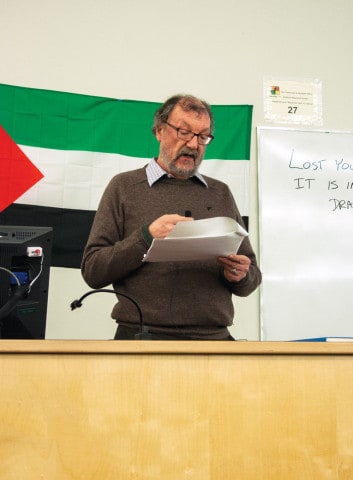On Feb. 26, Students for a Free Palestine hosted a panel discussion to raise awareness about the Israeli government’s violence towards the state of Palestine, as well as the intrusion of capitalism and corporatism into post-secondary education.
The event — dubbed “DemilitarizeUS” — was held in Neatby-Timlin Theatre. It featured three panelists: University of Saskatchewan professor Len Findlay, community organizer Stefan Christoff and activist Candyce Paul. Kotango Maburingo moderated the discussion.
The first panelist to speak was Findlay, who talked about how universities covertly support violence and war, a phenomenon he calls “campus complicity.”
“Universities are becoming increasingly dependent on corporate funding which comes with secret conditions and clauses,” said Findlay. “Academics themselves are becoming commodities whose expertise is used for arms manufacturers and others.”
Findlay brought up the example of Lockheed Martin, an American arms company that has sold weapons to Israel and has recently begun sponsoring universities in North America where government funding has been cut. There were talks between Lockheed Martin and the U of S in 2012, but no agreements were reached.
By accepting funding from Lockheed Martin and corporations which profit from colonialism and war, Findlay said universities are inadvertently supporting the military-industrial complex.
“Our governments are disinvesting in universities and our university may soon be forced to serve private interests,” Findlay said. “We need to criticize how money is taken in by universities and how it is spent.”
Findlay said that the solution is to insist on the public nature of universities and the maintenance of government funding.
“We’re no longer dealing with the liberal arts, but the neo-liberal arts: the view that market logic trumps human reason and human imagination,” said Findlay. “Universities should not be subject to the demands of corporations or the edicts of government.”

Len Findlay spoke at DemilitarizeUS on the university’s complicity in violence and war
According to Findlay, the Israeli-Palestinian conflict is “the most urgent political and ethical question internationally.
“We can’t let this continue to happen,” Findlay said.
Findlay, an English professor, is the director of humanities research at the U of S.
The second panelist to talk was Christoff, who spoke about the Boycott, Divestment and Sanctions (BDS) approach to Israel.
“The BDS movement really opens a very profound opportunity within the context of the university, but also in society, to explore the nature of the institutions that we’re a part of in regards to the democratic process,” said Christoff.
The campaign began in 2005 in response to the Israeli occupation of Palestinian territory, and its objectives include boycotting companies that profit from the Israeli-Palestinian conflict, as well as imposing economic sanctions on Israel.
“Palestinians have endorsed BDS as the primary method to counteract the Israeli colonial machine,” Christoff said. “One very concrete and tangible way to embrace and work with the BDS campaign is to challenge the presence of corporations which support the functioning of the Israeli military establishment.”
Christoff gave the example of Canadian company Bell Helicopter, which designed the helicopters that are used by the Israeli military and also sponsors a major aerospace program at Concordia University. According to Christoff, Bell Helicopters has several representatives on Concordia’s board of governors.
“The neoliberal corporatist vision is transforming, in a violent way, the public nature of universities,” said Christoff. “Questioning research grants which are linked to corporations, especially military corporations, is very important.”
Christoff said students should be using BDS as a tool to express their solidarity with Palestinians.
Paul was the final panelist to speak. As a member of the English River First Nation in northern Saskatchewan, she drew parallels between Canada’s history and present-day Palestine.
“Colonialism is a heavy-duty thing to live with,” said Paul. “We don’t want to see that happen anymore.”
By supporting the “war machine and surveillance state,” she said Canada risks repeating the mistakes of the past.
“The investment that these companies are putting into education is absolutely outrageous,” said Paul.
The event concluded with a question and answer session. When asked how Palestinian supporters can prevent confusion between BDS and anti-semitism, Christoff cited the “countless and overwhelming United Nations resolutions that illustrate the crimes committed by the Israeli government.”
“The West Bank and Gaza Strip are human rights disasters,” said Christoff. “Palestine is a human rights issue and anti-colonial issue, it has nothing to do with religion. The histories of Palestine and Canada are very different, but the fact is that the Palestinians are a colonized people.”
Christoff said that Canadians have to frame the conflict as an anti-colonialist one, stating that there are “an overwhelming number of Jewish voices in solidarity with Palestine.”
“The argument that BDS is anti-semitism is tired, it’s a trope, and it’s failing,” saidi Christoff. “We shouldn’t focus on religion, we should focus in human rights and colonialism. The more that we get drawn into a discussion that links Palestine to religion, the more we’re wasting our time.”
—
Photo: Jeremy Britz
Leave a Reply